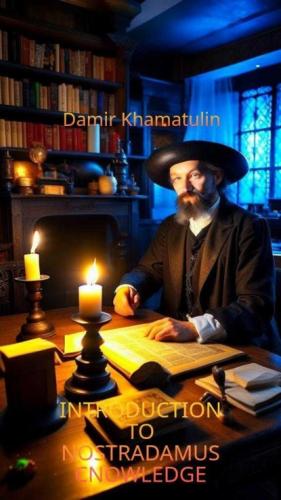The fourth line of the quatrain is literally translated in a slightly different way – “seven days at the gates of their enemies at (k) hour”, therefore, the keywords, according to this phrase, are involved in the search. There is no longer "before", "after", etc. There are only seven days. It seems that such a site was found in the Centuries.
4-50 … Que sept ne tiennent par ranc la hierarchies .
4-51 Vn duc cupide son ennemy ensuyure,
Dans entrera empeschant la phalange:
Hastez a` pied si pres viendront poursuiure
Que la iour nee conflite pres de Gange.
4-52 En cite' obsesse aux murs hommes & femmes…
Why exactly him? Answer: – in a close quatrain 4-55: " Durant sept heures ne fera que crier :". Yes Yes! Where this topic started, and thus ends. Crows are very adaptable birds to life in any conditions. Let them croak, since God has given the "royal birds" such a gift.
___________________________________________________________________________
With the next quatrain 5-90, there may be some progress related to the vision of the Nostradamus mysteries.
5-90 Dans les cyclades, en perinthe & larisse,
Dedans l'Sparte tout le Pelloponnesse:
Si grand famine, peste, par faulx connisse,
Neuf moys tiendra & tout le cherronesse.
In the Cyclades, in Perinth and Larissa,
In Sparta, the whole Peloponnese:
So great a famine, a plague, due to false support,
It will hold out for nine months, and all Chersonese.
Nine "months" have developed with the advent of quatrain 5-81. The unusual turns of speech of the quatrain, if taken literally, indicate that the mysterious Chersonesus – " cherronesse ", is somewhere here. Yes, surprisingly easy to find. It is also noted that the Author did not pull out a random card from the deck – a page: everything is the same place, the same "bird" quatrain. Here he : "Cherr + on + esse".
5-81 L'oyseau royal sur la cite' solaire,
Sept moys deuant fera nocturne augure:
Mur d'Orient cherr at on naire esclaire,
Sept iours aux portes les ennemis a l'heure.
5-82 Au conclud pache hors la forter esse …
Of course, this could not but interest. Next in line is the Peloponnese, it should appear somewhere in Sparta. She has only one option. "Sparta" – only at 6-84. Below is news from that place.
Yes, not everything is as slender and compact as in the last place, but " Pe + ll + op + onn + esse " is going to. (Again I had to intervene from the future. This site is justifiably so large. In addition to Sparta, there are “ per + int + he ”, and “ cy + cla + des ”, and “ LARISSE ”. And this list can be continued. Despite the scarcity previously collected useful information, I, in fact, very much doubted the chosen path… All these composing words from fragments found on an already "understandable" site – then struggled with the theory of probability … Who would "do" whom in the end was unknown).
6-82 … Par ceulx qu'apres _ _ occu per ont le cy p he .
6-83 Celuy qu'aura tant d'h onn eurs & car esse s,
A son entree de la gaule Belgique:
Vn temps apres fera tant de rudesses,
E t sera contre a` la fleur tant be ll ique.
6-84 Celuy qu'en Sparte Cla ude ne peult regner,
Il fera tant par voye seductiue:
Que du court, long, le fera araigner,
Que contre R oy fera sa pe rspectiue.
6-85 L a grand cite' de Tharse par Gaulois,
S era des truicte, captifz tous a` Turban:
S ecours par mer du grand Portugalois,
Premier d'este' le iour du sacre' Vrban.
6-86 Le grand Prelat vn iour apres son songe,
Int erprete' au rebours de son sens:
De la Gascoigne luy suruiendra vn monge,
Qui fera eslire le grand Prelat de sens.
6-87 L'eslection faicte dans Frankfort,
N'aura nul lieu, Milan s' op posera…
___________________________________________________________________________
I puzzled over the next quatrain for a long time . In the end, everything turned out to be very simple, which I did not expect at all.
5-92 Apres le siege tenu dixsept ans,
Cinq changeront en tel reuolu terme:
Puis sera l'vn esleu de mesme temps,
Qui des Romains ne sera trop conforme.
After a siege that lasted seventeen years,
Five will be replaced in the same period:
Then one will be elected at the same time,
Which the Romans won't do very well.
It is necessary simply from the very beginning of the centuries to count seventeen "– ans -" in any form, for example, the very first case: " tr ans mis ", etc. The last, seventeenth case falls on the wonderful quatrain 1-41. It is in it that the first word " Siege " in the Centuries is located.
1-41 Siege en cite' est de nuict assallie,
Peu eschape' : non loing de mer conflict:
Femme de ioye retours filz defaillie,
Poison & lettres cachees d ans le plic.
Absolutely for the same period, all the forms “ change …” ( changeant and changement ) appear in the text exactly five times. The last case is in quatrain 1-43, as part of the word “ changement ”, during the period of the seventeenth “ ans ”. (This is where my past entries on this topic end. For completeness, I will add today's observation).
esleu -” occurs twice (quatrains 1-12 and 1-13). The first case – fits what is written in the last two lines of quatrain 5-92. Collected word here – "co + nf + or + me".
1-10 … Ou les e nf ans septains du roy sont pris:
Les vieux & peres s or tiront bas de l'enfer,
Ains
